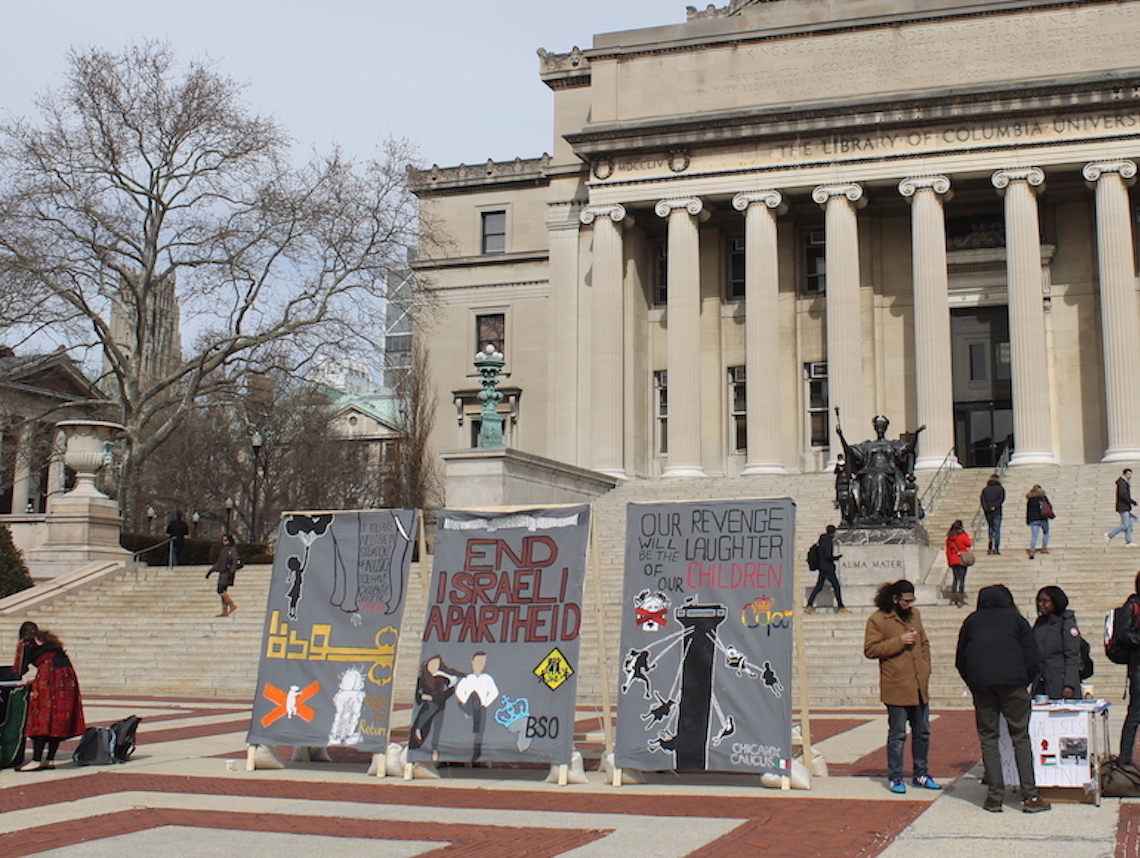 BDS protesters at Columbia University.
BDS protesters at Columbia University. Freedom of speech is an unquestioned birthright for Americans, and it is among the principles we feel most strongly about modeling for the rest of the world. The recent attempts by the Trump administration to curtail freedom of the press has many on both the left and the right justifiably up in arms at the assault on one of the founding ideals of our nation. So it comes as a political sucker punch that 43 senators on both sides of the aisle have come together to support a bill that clearly intends to chill Americans’ right to peacefully protest.
The bill, S720, co-authored by Ben Cardin (D-Md.) and Rob Portman (R-Ohio), titled the Israel Anti-Boycott Act, would expand the existing criminalization of U.S. corporations that participate in foreign-led boycotts against American allies to also include boycotts that originate from the United Nations. The title and key proponents of the bill, AIPAC chief among them, clearly intend it as a defense against the Boycott, Divestment and Sanctions (BDS) movement, which opposes Israeli occupation of the West Bank. As others have noted, the U.N. actually never called for a commercial boycott of Israel, and instead only urged companies in 2016 to “avoid, identify, assess and address any adverse human rights impacts related to their activities.” In other words, this bill purports to offer a solution for a problem that does not exist.
That this legislation offers no concrete policy solutions only makes the fervent support of its passage all the more troubling. Whether the bill actually criminalizes the right of individual Americans to participate in BDS (and the vagueness of potential interpretations should itself be a red flag), the message is clear: Americans should think twice before exercising their constitutionally protected free speech. No matter what we may think about the merits or motivations behind the BDS movement, we should be able to agree that the decision of how Americans choose to use their wallets should be left entirely up to them.
S720 not only betrays basic American values of freedom of speech, it also diminishes America’s already battered moral standing on the world stage by making the hypocrisy of our Middle East policy crystal clear. The United States has long desired to be a beacon of functional democracy and freedom , and an alternative model to the type of despotic tyranny that plagues the region. Yet with the passage of this bill, we would send the exact opposite message to the world, that the peaceful critique of a nation’s policies should in itself be a reprehensible and potentially criminal act. If President Donald Trump were to propose a domestic abridgement of free speech of this magnitude (not so far-fetched a scenario in the age of presidential smears against our free press), the majority of those same senators supporting this deeply flawed legislation would rightfully oppose such an action with every moral fiber of their being.
But this bill follows a disturbing pattern of the double standard that is applied to nonviolent protests by marginalized communities. Many on the right (and even some on the left) have criticized the Black Lives Matter movement as “violent,” suggesting that nonviolent protests would be more palatable to get their point across. Yet when San Francisco 49ers quarterback Colin Kaepernick, who is African-American, knelt during the national anthem, he was criticized for being “combative” and “unpatriotic.” Likewise, the BDS movement is entirely peaceful, noncombative and (one could argue because it uses capital to achieve its goals) a most American form of protest. But by targeting these forms of expression, the Senate is leaving those who support the movement few options for lawful dissent.
This bill is so far removed from traditional American values that even J Street, a perennial critic of the BDS movement, has condemned it in a statement saying that it would “undermine decades of U.S. policy toward the Israeli-Palestinian conflict, bolster the settlement enterprise and harm the prospects for a two-state solution.” The statement goes on to recommend that Senators “consult with free speech experts on possible Constitutional concerns with the bill.”
The Israeli-Palestinian conflict — and specifically the issue of the West Bank — is complex, and reasonable people can disagree about solutions and strategies. But no good has ever come from criminalizing peaceful protest, whether through substance or intent, or the exercise of free speech, and it will not be any different in this case. As long as we continue speaking to one another and making our opinions heard, there always is a chance to find common ground.
Salam Al-Marayati is the president of the Muslim Public Affairs Council.























 More news and opinions than at a Shabbat dinner, right in your inbox.
More news and opinions than at a Shabbat dinner, right in your inbox.